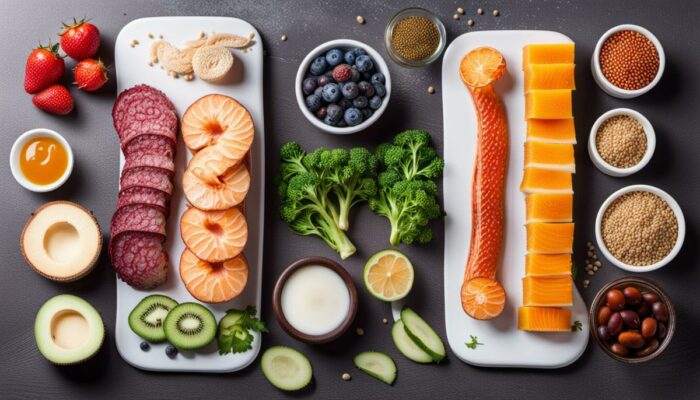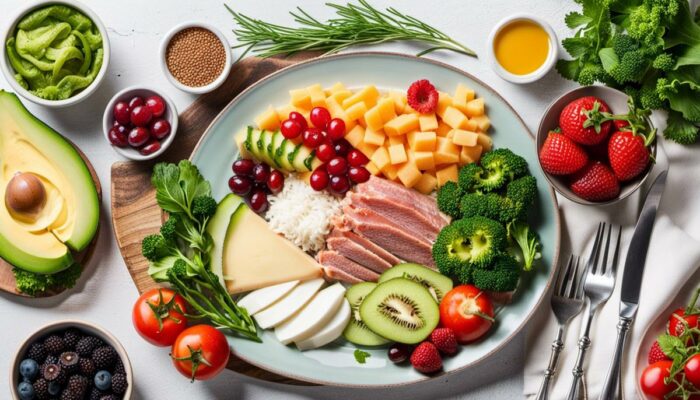For many people, understanding Ulcerative Colitis may be like navigating through an intricate maze. This condition, which primarily affects the digestive system, presents a range of symptoms that can be quite distressing. Long discussed but seldom completely understood, Ulcerative Colitis is an inflammatory bowel disease that demands intricate care, particularly with regard to diet.
The choices one makes, be it the selection of fruits or the preference of staples, can have a staggering sway over the state of one’s gut. This piece aims to shed light on dietary best practices and offer guidance in managing Ulcerative Colitis effectively.
So if this is something that you feel may be good information then please keep reading…
The Best Ulcerative Colitis Diet Tips for Meal Planning
Diet does not cause Ulcerative Colitis. However, it can significantly influence the symptoms you experience, the health of your gut, and your overall well-being. Consuming certain types of food may exacerbate symptoms, whilst others may help control them, although this can differ from person to person.
Especially during a flare-up, high-fibre foods such as whole grains and certain fruits or vegetables can intensify diarrhoea and abdominal pain. Dairy products may also have similar effects on some people.
Meanwhile, including plenty of fluids in your diet can prevent dehydration associated with diarrhoea.
Balancing your diet is also crucial in maintaining your nutrition intake as the condition can decrease your appetite and disrupt the absorption of nutrients from your food. To this end, a diet rich in protein can provide the necessary building blocks for maintaining your body’s health.
Specific Diet Recommendations
Though there’s no one-size-fits-all diet for UC, some diet recommendations have been observed to potentially help manage the condition. These include a low-residue diet, which limits high-fibre foods to help the colon rest during flare-ups. Whilst, a lactose-free diet might be beneficial for those who are lactose intolerant alongside being diagnosed with UC.
It should also be noted to exercise caution with nonsteroidal anti-inflammatory drugs (NSAIDs) like ibuprofen, which can aggravate the symptoms of UC.
Alcohol and caffeine too could exacerbate diarrhoea also and should thus be avoided during flare-ups.
Consulting With Healthcare Professionals
Every individual living with Ulcerative colitis (UC) tends to experience it in a unique way, making it crucial to consult with a healthcare professional or a registered dietician for personalised dietary and lifestyle advice.
They are able to combine specific recommendations with thorough documentation of your symptoms and eating habits, providing a means of identifying possible food triggers and aiding in the effective management of UC flare-ups.
However, it’s important to remember that while dietary and lifestyle changes can be beneficial in managing symptoms of UC, they should not be seen as a replacement for prescribed medical treatments. It’s key to follow the medical management plan provided by your healthcare provider with adherence, regarding dietary adjustments as supplementary measures that can support better general health.

Role of Diet in Managing Ulcerative Colitis
Recognizing the Role of Diet in Managing Ulcerative Colitis
Ulcerative colitis is a lingering disease leading to inflammation and ulceration in the colon and rectum. Such inflammation and ulcers can alter bowel movements and create abdominal pain, often leading to a substantial effect on a person’s overall lifestyle and comfort. Understanding how the right diet can support symptom management in UC is, thus, a critical component of living with this condition.
Pro-Inflammatory Foods to Avoid
Certain foods are known to provoke inflammation and may worsen ulcerative colitis symptoms. Among these are processed foods high in trans fats and sugars. These include deep-fried or fast foods, pastries, and sugary drinks. It’s believed that these foods negatively affect the balance of ‘healthy’ gut bacteria, leading to an increase in inflammation.
Foods high in fiber, such as whole grains, fruits, and vegetables, can also be problematic. This is because they can be difficult to digest, leading to aggravated gastrointestinal symptoms like gas, bloating, and diarrhea.
Anti-Inflammatory Foods to Include
It’s not all about restriction, though. Some foods can help soothe inflammation in the gut and promote well-being. For instance, omega-3 fatty acids, found in fatty fish like salmon and mackerel, as well as flaxseeds and walnuts, are proven to reduce inflammation.
Fermented foods, such as yogurt, kefir, and sauerkraut, are rich in probiotics – these are healthy bacteria that can help restore the gut microbiota balance, potentially reducing inflammation.
The Role of Hydration and the Importance of a Balanced Diet
Hydration is essential for people with ulcerative colitis. Being low in fluids can worsen constipation, a common symptom of the disease. Furthermore, a balanced diet is vital. Although, no food or food group should be entirely eliminated unless recommended by a healthcare professional. This is because various nutrients work together to support overall health and well-being.
Taking Extra Care While on an Ulcerative Colitis Diet
Those with ulcerative colitis should remember to introduce dietary changes gradually, monitoring symptom responses closely. Rapid alterations can make it difficult to identify which modifications are beneficial.
Although diet alone cannot cure ulcerative colitis, it can significantly influence how the condition affects someone. Mindful eating, leaning towards anti-inflammatory foods whilst disregarding pro-inflammatory ones, ensuring hydration, and maintaining a balanced nutritional intake, all contribute to managing this disease effectively. Regular advice from a dietitian or healthcare professional is highly recommended.

Best and Worst Foods with Ulcerative Colitis
Recommended Foods for Ulcerative Colitis
Certain foods can encourage gut health and lessen discomfort when living with ulcerative colitis. Here are some examples:
- Chicken: Lean proteins such as chicken can be easy on the digestive tract and are packed with essential nutrients. They contain amino acids that aid in repairing damage in the intestines and improving overall gut health.
- Salmon: High in omega-3 fatty acids, salmon might assist in reducing inflammation in the body. Nevertheless, light preparation methods, including baking or steaming, are preferred to avoid excess irritation.
- White Basmati rice: This starchy food is suitable for those with ulcerative colitis due to its low fiber content, making it easy to digest and energy-rich.
- Bananas: These are known for their high pectin content, which can aid digestion. They also replace potassium which can deplete during a flare-up.
- Yogurt: Probiotic yogurts or those containing ‘live and active cultures’ may contribute to the ‘good’ bacteria in the gut. If lactose intolerance is an issue, consider alternatives like lactose-free yogurt or kefir.
- Avocados: Known for their plentiful healthy fats and ease of digestion for most individuals, avocados can offer vital nutrients without causing irritation.
Worst Foods for Ulcerative Colitis
Conversely, there are foods known for potentially exacerbating symptoms or triggering a flare-up of Ulcerative Colitis.
- Dairy Products: For those who are lactose intolerant, symptoms such as bloating, diarrhoea, and gas might be heightened when consuming dairy products.
- Spicy Foods: These can often cause irritation in the digestive tract, potentially leading to diarrhoea and discomfort.
- Alcohol: Alcohol can irritate the intestines and has the potential to cause a flare-up, particularly when consumed in excess.
- Caffeinated Beverages: Like alcohol, caffeine can also stimulate the intestines and cause diarrhoea. This is found in coffee, tea, cocoa, and energy drinks.
- High fiber fruits and vegetables: Foods such as broccoli, apples, oranges, and whole-grain bread contain large amounts of fiber that can cause pain, diarrhoea, or bloating in people with Ulcerative Colitis.
- Fatty and Sugary Foods: Foods high in fats and sugars may exacerbate symptoms and lead to malabsorption of nutrients.
As the conclusion herein suggests, this manual provides a basic understanding of potential dietary triggers for individuals dealing with Ulcerative Colitis. However, everyone is unique, so one person’s dietary solution may not necessarily align with another’s.
To ensure an effective diet specific to your condition and personal needs, a consultation with a dietician or a healthcare professional is highly recommended. The ultimate goal is to create a dietary balance that enhances overall health and minimizes any symptoms or discomfort associated with Ulcerative Colitis.

Creating a Personalized Ulcerative Colitis Diet
Diet and Ulcerative Colitis: An Overview
Ulcerative Colitis, also known as UC, is a long-term condition characterized by inflammation in the large intestine’s lining, or colon. The symptoms of UC can differ greatly for each individual, but common ones include abdominal discomfort, increased frequency of bowel movements, and rectal bleeding.
An individual’s diet and nutritional intake can significantly influence the severity and management of these symptoms. However, given the unique nature of each patient, it is crucial to remember that dietary changes that benefit one person may not necessarily offer the same positive effects for another.
Creating a Personalised Diet Plan
To establish a personalized diet, you must first identify which foods trigger your UC symptoms. This is typically done through a process of elimination – removing one potential trigger food from your diet at a time and observing any changes in symptoms.
This can be a slow process, but it is essential to pinpoint dietary triggers. Common irritants often include spicy foods, alcohol, caffeine, and certain high-fiber foods, but individual experiences can vary greatly.
Incorporating a Balanced Diet
Despite the process of elimination, it is crucial to have a varied, balanced diet that enables you to meet your nutritional needs. UC patients may also be at risk of malnutrition due to reduced appetite or nutrient absorption. Including lean proteins, whole grains, fruits, and vegetables can help provide necessary nutrients.
Still, if you find certain foods exacerbate your symptoms, alternatives can be explored. For instance, if raw vegetables cause distress, steamed or cooked vegetables may still be enjoyed.
Suggested Recipes and Food Alternatives
Creating meals that are both enjoyable and kind to your gut can be a challenge when suffering from UC. However, food substitutes and new recipes can revamp your eating experience.
For instance, if dairy products trigger your symptoms, non-dairy alternatives can be tried, like almond or coconut milk. Instead, if whole grains exacerbate your symptoms, white bread or white rice can be adopted into your diet.
Recipes that might be gentle on a UC-afflicted stomach often adhere to a low-residue diet – a diet low in fiber and other foods that are difficult to digest. A simple chicken and rice soup could be a soothing choice. This can be made by boiling chicken breast in stock, adding white rice, and seasoning lightly to your preference.
Professional Advice and Support
While trial and error are fundamental in determining your personal diet, consulting a dietitian or nutritionist specializing in gastrointestinal disorders will be incredibly valuable. They can offer professional advice tailored to your unique circumstance, ensuring your dietary plan satisfies both your nutritional needs and symptom management.
Regular consultations with a healthcare provider can also provide support in navigating your personal UC journey.
Remember that dealing with Ulcerative Colitis may be overwhelming at times, but you are not alone. Patient support groups, dietitians, and physicians can offer care and guidance on this journey.
By learning how foods uniquely impact your symptoms, you can create a personalized diet that helps manage your Ulcerative Colitis and improve your quality of life.

Photo by luisabrimble on Unsplash
In Conclusion
Ulcerative Colitis challenges not just the physical fabric of your life but also the emotional part of your reality. This condition calls for specific dietary modifications to alleviate discomfort and manage symptoms. The secret lies in understanding your body, listening to it, and reacting with informed responses.
By learning to recognize the foods that are beneficial and those that may induce harm, along with envisaging a personalized diet plan, you can be a champion of your own health.
Remember, knowledge is power – be patient, take small steps, and make informed choices to conquer your everyday challenges. Above all else, let your relationship with food transform from a battle into a dance, where you lead with confidence and strength.




Anxiety and Depression best ways to lower blood sugar BiOptimizers blood pressure supplements blood sugar support supplements Digestive Enzymes Supplement digital products Dr Sam Robbins Erectile dysfunction Exercise Gut Health Healthy Living heart health HFL how to lower blood sugar levels How To Lower Cholesterol insulin resistance joint health supplement Keto keto dieting Keto Diet Weight Loss leaky gut supplements leptin resistance list Magnesium deficiency Matt Gallant mental health multivitamins Nootropics nutrient supplements Probiotics Probiotic Supplements proteolytic enzymes reverse type 2 diabetes stress and anxiety stress relief vitabalance vitapost Wade Lightheart weight loss articles weight loss diet plans weight loss product reviews weight loss supplements weight loss supplements that work weight loss tea
